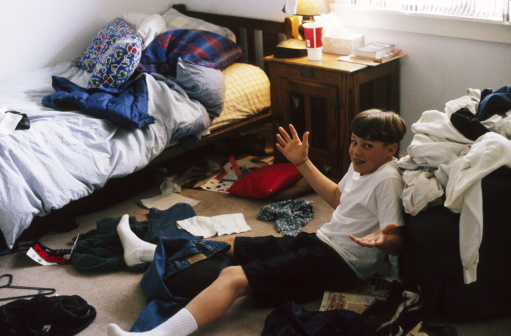In the Northern Hemisphere, school is starting and in the Southern Hemisphere, you are all (well, at least those of you involved with education) thinking about the last part of the school year. In either case, the issue of organization may have reared its shaggy head because your son is unable or unwilling to organize his school work. That is the first part of this issue, is it that he simply will not be organized at least in part because all the adults in his life seem to be obsessed with this idea, or is it that he is unable to organize himself and is baffled about how to begin?
 Some new research into gender differences in how adolescent brains function may throw some light on this. Now please know that this is stepping into the realm of pseudoscience – using scientific findings to support statements that the original science never addressed. But since there isn’t any real research on this, I think I can be excused for making this leap. The research, which came out in January, 2014, reveals that female brains are best designed to connect analytical and intuitive thinking and male brains are best designed to connect perception and action.
Some new research into gender differences in how adolescent brains function may throw some light on this. Now please know that this is stepping into the realm of pseudoscience – using scientific findings to support statements that the original science never addressed. But since there isn’t any real research on this, I think I can be excused for making this leap. The research, which came out in January, 2014, reveals that female brains are best designed to connect analytical and intuitive thinking and male brains are best designed to connect perception and action.
You may have noted that many women ruminate, that is they think over and over the same problem attacking the issue from different standpoints. This is the analytical approach to thoughts which arise from the connections made to other events in the woman’s life. Males, on the other hand, seem to be unable to do this, thinking about something in the present and then, once a decision is made, dropping it entirely. This is the approach of seeing a problem, acting on it, and then the event is over. Another way of looking at this is to say that women’s thoughts are totally interconnected and male’s thoughts are compartmentalized.
There is a very amusing clip on You Tube which I recommend that you look at. It is a talk on the difference between men’s and women’s brains by Mark Gungor and seems to be originally posted six years ago. Click here to watch it.
While this talk predates the research, the observations are very clearly supported by the research. It just goes to show that good observations about people may well be correct. So what does this have to do with organization? The problem is that once a boy has finished with something, he puts it down and forgets about it. It does not occur to him that the material is in the way – if it is, he will just sweep it aside adding to the mess. He does not realize that he will need to find the material again – in which case he will ask you to help him find it. He is finished with the material and there is stays.
One method that helps, at least at home, is to use boxes. Tell him that once he has finished with something, it goes in the appropriate box – toys, sports equipment, clothes, shoes, school work and the like. It is easier to get him to put items away if he only has big categories to think about and at least means that he has fewer places to look for things. You have to remember, that items that are put entirely away may cease to exist for males since they may have no memory of where the object was stored. Fewer boxes means that his chance of remembering which category the item belongs in and therefore where he can find it, is greater.
One part of this problem that totally frustrates mothers is that boys who cannot find their homework or have no idea that they have a test the next day, have no trouble remembering where their sports equipment is and when (and where) they will have their next game. The point is that sports matters to your son and school does not. Sports are a place where his activity can shine and there are a limited number of people and items for him to focus on. School involves many different pieces of paper, books, assignments and the like, and is complicated as he goes up in school moving from one teacher to many. I taught science and boys really liked my class – after all we had fire and danger in the lab! Boys rarely forgot to do the homework for my class and one told me it was because he would think about what we did in lab later in the day – it was that exciting. So when he thought about his day, he would remember our lab exercise, and then remember he had a report to write.
I don’t know how to get your son to like every class that much, but after all, you are concerned with his lack of organization at home. So remember that he doesn’t connect items together, but drops them when he is finished with them. Help him learn to sort his possessions into big piles and you may be able to get him to start actually putting things away. After all, miracles do occur!
